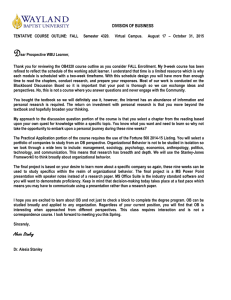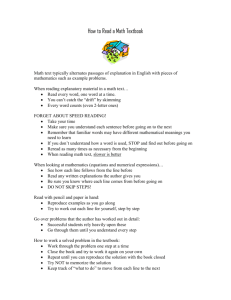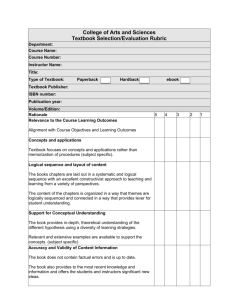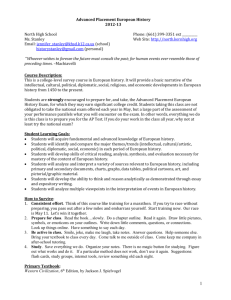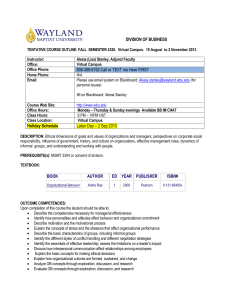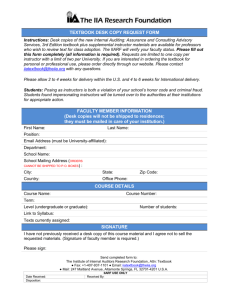Organizational Behavior - Wayland Baptist University
advertisement
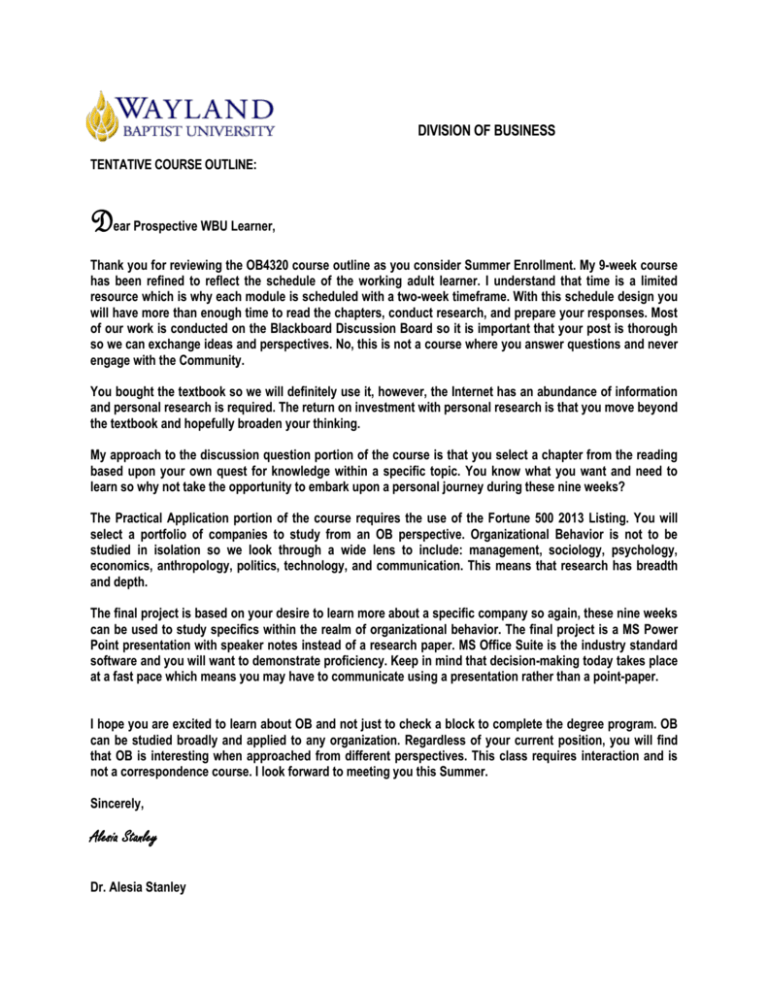
DIVISION OF BUSINESS TENTATIVE COURSE OUTLINE: Dear Prospective WBU Learner, Thank you for reviewing the OB4320 course outline as you consider Summer Enrollment. My 9-week course has been refined to reflect the schedule of the working adult learner. I understand that time is a limited resource which is why each module is scheduled with a two-week timeframe. With this schedule design you will have more than enough time to read the chapters, conduct research, and prepare your responses. Most of our work is conducted on the Blackboard Discussion Board so it is important that your post is thorough so we can exchange ideas and perspectives. No, this is not a course where you answer questions and never engage with the Community. You bought the textbook so we will definitely use it, however, the Internet has an abundance of information and personal research is required. The return on investment with personal research is that you move beyond the textbook and hopefully broaden your thinking. My approach to the discussion question portion of the course is that you select a chapter from the reading based upon your own quest for knowledge within a specific topic. You know what you want and need to learn so why not take the opportunity to embark upon a personal journey during these nine weeks? The Practical Application portion of the course requires the use of the Fortune 500 2013 Listing. You will select a portfolio of companies to study from an OB perspective. Organizational Behavior is not to be studied in isolation so we look through a wide lens to include: management, sociology, psychology, economics, anthropology, politics, technology, and communication. This means that research has breadth and depth. The final project is based on your desire to learn more about a specific company so again, these nine weeks can be used to study specifics within the realm of organizational behavior. The final project is a MS Power Point presentation with speaker notes instead of a research paper. MS Office Suite is the industry standard software and you will want to demonstrate proficiency. Keep in mind that decision-making today takes place at a fast pace which means you may have to communicate using a presentation rather than a point-paper. I hope you are excited to learn about OB and not just to check a block to complete the degree program. OB can be studied broadly and applied to any organization. Regardless of your current position, you will find that OB is interesting when approached from different perspectives. This class requires interaction and is not a correspondence course. I look forward to meeting you this Summer. Sincerely, Alesia Stanley Dr. Alesia Stanley Instructor: Office: Office Phone: Home Phone: Email: Alesia (Lisa) Stanley, Adjunct Faculty Virtual Campus 808 499-9192 Call or TEXT me Here FIRST N/A Please use email system on Blackboard; Alesia.stanley@wayland.wbu.edu (for personal issues) IM on Blackboard: Alesia Stanley Course Web Site: Office Hours: Class Hours: Class Location: http://www.wbu.edu Monday – Thursday & Sunday evenings Available BB IM CHAT 8 PM – 10PM HST Virtual Campus Holiday Schedule DESCRIPTION: Ethical dimensions of goals and values of organizations and managers, perspectives on corporate social responsibility, influence of government, history, and culture on organizations, effective management roles, dynamics of informal groups, and understanding and working with people. PREREQUISITE(s): MGMT 3304 or consent of division. . TEXTBOOK: BOOK AUTHOR Organizational Behavior Andre Rae ED YEAR PUBLISHER 1 2009 Pearson OUTCOME COMPETENCIES: Upon completion of this course the student should be able to: Describe the competencies necessary for managerial effectiveness Identify how personalities and attitudes affect behavior and organizational commitment Describe motivation and the motivational process Explain the concepts of stress and the stressors that affect organizational performance Describe the basic characteristics of groups, including informal groups Identify the different styles of conflict handling and different negotiation strategies Identify the essentials of effective leadership; assess the limitations on a leader’s impact Discuss how interpersonal communication affect relationships among employees Explain the basic concepts for making ethical decisions Explain how organizational cultures are formed, sustained, and change Analyze OB concepts through exploration, discussion, and research ISBN# 0-131-85495x Evaluate OB concepts through exploration, discussion, and research Synthesize OB concepts through exploration, discussion, and research Demonstrate a high level of OB competency through discussion, research, inquiry, and reflection COURSE REQUIREMENTS AND EVALUATION: The grading scale is as follows: Discussion Questions Practical Application Quiz Final Project Total Points 90% 80% 70% 60% 50% 100 points 40 points 20 points 40 points 200 points Parts I, II, III, IV, and V Parts I, II, III, IV, and Course Reflection Parts I, II, III, IV, and Exit Individual Project (NO RESEARCH PAPER) A Grade B Grade C Grade D Grade F Grade Incompletes must be discussed with and approved by Instructor on a case by case basis. ATTENDANCE POLICY: Each student should login at least 2 times each week to keep current with the class work and to check the announcement board for messages or notices. Please refer to the latest WBU Academic Catalog for specific attendance details. The University expects students to actively participate in the online course. The Blackboard software effectively measures participation. There are no scheduled class meetings. All information pertaining to this course is on the virtual campus website. If you must be absent or cannot logon please notify the Instructor or IT support as applicable. ACADEMIC HONESTY: This class will adhere to zero tolerance for using someone else’s work as your own. Students are responsible for reading, understanding, obeying, and respecting all academic policies, with added emphasis being placed upon academic progress policies, appearing in the Wayland Baptist University Academic Catalog applicable to their curriculum and/or program of study DISABILITY STATEMENT: It is university policy that no otherwise qualified disabled person be excused from participation in, be denied the benefits of, or be subject to discrimination under any educational program or activity in the University. Students should inform the instructor of existing disabilities at the first class meeting. COURSE OUTLINE/CALENDAR. The textbook is divided into five parts and we will follow this format for the entire course. Each part will have a two-week timeframe. In this notion, you have ample time to complete each learning activity. The assignments are due on the date posted and late work will be penalized 5 points for lateness. I understand that life happens so if you have a life situation, be sure to let the Instructor know ASAP. You will want to contact the Instructor at Lstan2k@aol.com /call/text 808 4999192 if life happens. COURSE WORK OVERVIEW Part I. Chapters 1 - 8. Timeframe: Two Weeks TBD Items Due: Discussion Question: Blackboard Discussion Board Part II. Chapters 9 - 10. Groups Dates TBD Timeframe: Two Weeks Items Due: Discussion Question: Blackboard Discussion Board Part III. Chapter 11- 14. Leadership Dates TBD Timeframe: Two Weeks Items Due: Discussion Question: Blackboard Discussion Board Part IV. Chapters 15 - 18. The Organization Dates TBD Timeframe: Two Weeks Items Due: Discussion Question: Blackboard Discussion Board Part V. Chapter 19. Beyond The Textbook Time Frame: Week 9 Item Due: Quiz Test Link Independent Study: Work on Final Project Due Dates TBD Timeframe: Weeks 10 of the course Note: Use Assignment Link for Final Project Item Due: Final Project – Due (TBD) (Upload via Assignment Link) Syllabus dates may change at the discretion of instructor. Discussion Questions For Parts I, II, III, and IV discussion questions will be posted by the instructor. Using the Socratic method for teaching and learning, discussion questions are used to engage and stimulate a scholarly discussion among all learners. The goal is to move beyond the textbook which means online research is required. Thinking Broadly Concepts: As you approach the reading of our textbook and conduct research, consider the study of OB through a broad lens to include the following concepts: Culture Communication Management Politics Economics Anthropology Psychology Sociology Technology Discussion question responses will be posted on the Discussion Board. Due to the fact that this is a 400-level course, responses should reflect higher order thinking and take us beyond the textbook. We will all read from the textbook as the basis of our understanding however the Internet has a wealth of information on the topics so we can extend and enhance our learning of the different topics. In this case exploration is encouraged and required. You will have two weeks to adequately prepare your discussion question responses. The responses should be qualitative which means I’m not looking for a specific word count, however, this is a 400-level course which means that you will take a cross-discipline approach with your responses. This means that you will consider past learning from your academic program in which to fully develop your responses. Review Anderson and Krathwohl's Taxonomy to better understand higher-ordered thinking and then prepare your responses. The 20--point grading scale for the DQs will be partially used based on this taxonomy. Additional discussion topics include: OB Competencies: Self Awareness Emotional Intelligence Communication Diversity Ethics Across Cultures Teams Change Practical Application: Fortune 500 (40) Points The Fortune 500 List shows a list of profitable companies throughout the industries. In additional to selecting a company to analyze for the final project, students will select two companies to study OB to gain a broader interdisciplinary perspective. Scenarios and mini-case studies will be utilized to explore the selected companies on the recent Fortune 500 Listing. Final Project (40 Points) The final project is cumulative and covers all chapters of the textbook and additional references you have accessed over the past few weeks. Not all learning takes place in the classroom so we will step outside of the classroom to further explore organizational behavior. Task: Select a company to research its overall organizational behavior. You will select a company from the Fortune 500 2013 listing. Preferably you will want to select a company within an online presence as you will be asked to share the URL so we can virtually visit the organization. We will discuss the Final project throughout the course. A sample project will be posted. Visit: www.money.cnn.com/magazines/fortune/fortune500 and select a company of your choice for the final project. Use the table of contents from our textbook to extract the overall organizational behavior of the organization. Use the competencies as applicable to extract organizational behavior issues. Submit as a MS Office Power Point presentation with 20 – 25 slides with speaker notes. Teaching Philosophy(Condensed version) My online teaching philosophy is deeply inspired by Garrison, Anderson, and Archer’s Community of Inquiry because the educational experience is the core of why we are here as adult learners. I value emotional presence because no longer should a learner feel or believe that he/she is learning in isolation which is why I have included LinkedIn as part of our interaction with technology and each other. Learning can be a social experience if we are open to purposeful collaboration. I use wikis and blogs as a means of purposeful interaction to stimulate social presence. Blackboard Instant Messenger and Skype are additional communication tools for online interaction. The discussion board becomes the heart and soul the Community because it is here that we display our scholarly work which often lends itself to additional postings on the wikis and blogs. My teaching presence is visible throughout different dimensions of Black Board. You will find that not all teachable moments occur in the discussion forum which is why you are encouraged to move beyond the textbook and learn to use accessory tools such as YouTube and Slideshare for example. My goal is to engage and challenge the adult learner who wants to experience learning on a continuum.
